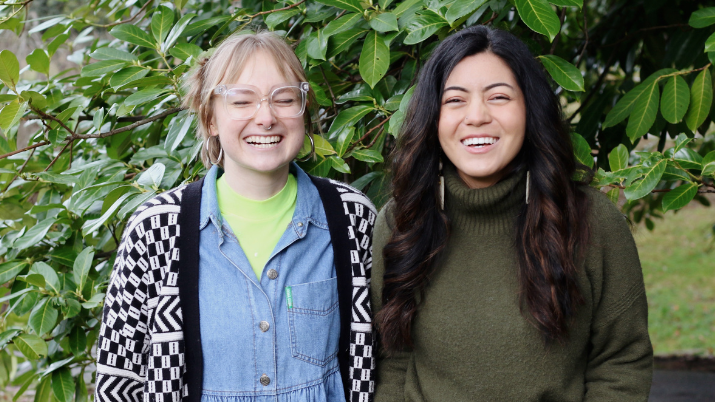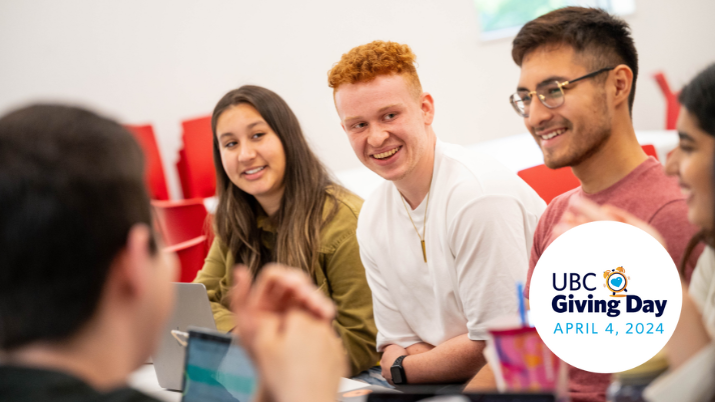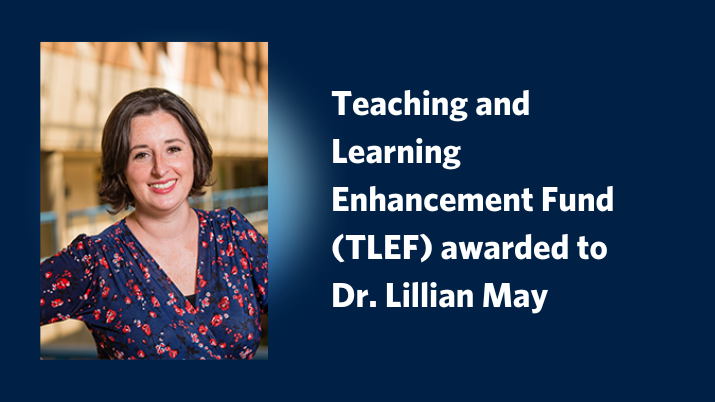

Meet Mac (she/they), pictured on the left, and Abril (she/her), on the right: the voices behind ‘Chivalry is not Dead’
Written by Khushi Mehta
Who says radio is out? For Mac Landerholm (she/they) and Abril (she/her), their radio show is how they communicate their love for Animal Psychology to the UBC community. We first heard about this show when Dr. Kiran Soma, who was featured on one of the episode’s of the show, told us about it. I knew that we needed to talk to the voices and minds behind the show right then.
The show is hosted at CiTR – UBC’s on-campus radio station. The recording of the radio show titled: ‘Chivalry is not Dead: Animal Neuroscience for Dummies’ can be found on the CiTR 101.9 FM website.
But who are Mac and Abril?
Abril and Mac are both fourth year students. Abril is studying Psychology and International Relations, while Mac is majoring in Psychology with a minor in Gender, Race, Sexuality, and Social Justice.
I was interested in seeing why, in the burgeoning age of short-form content, Abril and Mac decided to create a radio show.
“Along with the rest of our generation, I’m definitely guilty of having a shorter attention span these days. It’s easy to scroll on Instagram or TikTok for that rush, but I often find that longer-form content is so much more gratifying.” says Abril.
“And thanks to my mom,” she continues, “I grew up as a backseat listener to NPR shows like ‘This American Life’ with Ira Glass. I didn’t see it when I was younger, but it’s given me an appreciation for good investigative journalism and good storytelling in general.”
“It's funny, a lot of people seem to think radio is dead or dying, but I selfishly want to believe that it isn't going anywhere.”
The idea for this particular show sparked when Abril and Mac were studying together for ‘PSYC 306: Principles of Animal Behaviour’. Abril happened to mention to Mac how it could be fun to translate all the things they were learning in class into an audio format… that’s how the idea was born.
“Our study sessions would last for hours because we would focus on one behaviour forever,” reminisces Mac, “We love to rant and rave about our anthropomorphic examples, so this radio show was a great excuse to focus on our favourites! A short video wouldn’t give us enough time to talk about everything we wanted to, a radio show was the perfect medium.”
Since not many of us have a radio show, I wondered about Abril and Mac’s favourite parts of hosting.
“Honestly, co-hosting with Mac! They’re knowledgeable and passionate about the animal kingdom in ways I can only aspire towards, so it was exciting to riff off of each other on the show,” says Abril, “We’d find ways of anthropomorphizing concepts we’d learned about with Dr. Soma – terms like conspecific competition and consortships – and turning the science and theory into something we could relate to.”
Both of them were also super excited about talking about animal behaviours with Dr. Soma outside of class. “It was lots of fun interacting with Dr. Soma. In huge PSYC classes, you rarely get to interact with your prof, so it was great to chat with him. He is full of super interesting information that I loved hearing about. Sharing information without the pressure of final exams is such a gift.” says Mac. I couldn’t agree more.
But how does one turn the idea of a radio show into reality?
“I’ve been fortunate enough to work with the community at CiTR and they were doing a call-out for their 24 Hours of Student Power. [This is] an event they host every year to promote all the student-run programming they help produce.” Abril says. “We got in touch with them and they helped connect us to studio resources and get us on air. If you’re interested in getting involved with radio, CiTR is always looking to spotlight new voices.”
Mac, however, knew nothing about CiTR, but they were excited about the idea, “I was along for the ride,” they say, “We started out by reviewing our notes and selecting our favourite animal behaviours from the class that we wanted everyone to know about. We storyboarded and organized them so we could see the connections to transition between animals.”
Dr. Soma got involved when the co-hosts realized their shared love for hearing him talk about the animal behaviours he loved. “…so we asked to include him in the show,” Mac recalls, “He was really excited about it.”
“Students, this is your sign to ask your profs to participate in your silly ideas; research is not the only way to build a relationship with them.”
It’s always inspiring to see students sharing their voices, especially because we collectively know how hard it is to do so. I asked Mac and Abril for advice they would give to other students wanting to do the same.
“Knowledge is a gift,” Mac says, “[You need to] share it. People should not have to pay thousands of dollars to access information; the radio is a great medium to share knowledge.”
Abril says, “Do away with the pressure to perform. You don’t have to sound well-spoken to have your ideas be taken seriously.”
“There is something incredibly special about the way you sound - your thoughts, your mannerisms, your physical voice, the way you approach the things you're learning about - and that's something people want to listen to. It may not sound professional immediately. It's okay to stumble at the start. Once you've gotten your foot out the door, the rest is easy.”
Perhaps it should be our resolution to not let ourselves be held back by our desire to not look “cringe”. What else would the hosts like us to take away from the show?
“It took this course to get me thinking about speciesism in a meaningful way.” Abril says, “We like to think that we, as humans, are superior in our intelligence and communication. Surely, there are things that distinguish us from other organisms, but that shouldn’t take away from how incredible and rich the animal kingdom is. Try learning about an animal you don’t know too much about. Get curious! There’s so much to learn about the world around us.”
“Science does not have to be serious, having fun with it is the best part. Find a niche that you enjoy and run with it.”


